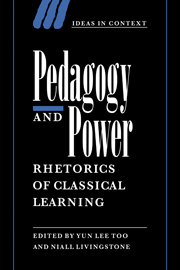Book contents
- Frontmatter
- Contents
- Notes on contributors
- Acknowledgements
- Introduction
- 1 Classics: from discipline in crisis to (multi-)cultural capital
- 2 Schoolboys and gentlemen: classical pedagogy and authority in the English public school
- 3 ‘Die Zung’ ist dieses Schwert': classical tongues and gendered curricula in German schooling to 1908
- 4 ‘What does that argue for us?’: the politics of teaching and political education in late eighteenth-century dialogues
- 5 Women and classical education in the early modern period
- 6 Pilgrimage to Parnassus: local intellectual traditions, humanist education and the cultural geography of sixteenth-century England
- 7 ‘Not so much praise as precept’: Erasmus, panegyric, and the Renaissance art of teaching princes
- 8 Teachers, pupils and imperial power in eleventh-century Byzantium
- 9 Reading power in Roman Greece: the paideia of Dio Chrysostom
- 10 Children, animals, slaves and grammar
- 11 A good man skilled in politics: Quintilian's political theory
- 12 The voice of Isocrates and the dissemination of cultural power
- 13 Xenophon's Cyropaedia: disfiguring the pedagogical state
- Select bibliography
- Index
- IDEAS IN CONTEXT
12 - The voice of Isocrates and the dissemination of cultural power
Published online by Cambridge University Press: 30 September 2009
- Frontmatter
- Contents
- Notes on contributors
- Acknowledgements
- Introduction
- 1 Classics: from discipline in crisis to (multi-)cultural capital
- 2 Schoolboys and gentlemen: classical pedagogy and authority in the English public school
- 3 ‘Die Zung’ ist dieses Schwert': classical tongues and gendered curricula in German schooling to 1908
- 4 ‘What does that argue for us?’: the politics of teaching and political education in late eighteenth-century dialogues
- 5 Women and classical education in the early modern period
- 6 Pilgrimage to Parnassus: local intellectual traditions, humanist education and the cultural geography of sixteenth-century England
- 7 ‘Not so much praise as precept’: Erasmus, panegyric, and the Renaissance art of teaching princes
- 8 Teachers, pupils and imperial power in eleventh-century Byzantium
- 9 Reading power in Roman Greece: the paideia of Dio Chrysostom
- 10 Children, animals, slaves and grammar
- 11 A good man skilled in politics: Quintilian's political theory
- 12 The voice of Isocrates and the dissemination of cultural power
- 13 Xenophon's Cyropaedia: disfiguring the pedagogical state
- Select bibliography
- Index
- IDEAS IN CONTEXT
Summary
Twentieth-century reading of Isocrates has tended to concentrate on his achievements or shortcomings as a ‘thinker’ rather than on his pedagogy, but he has a long-established image as one of antiquity's supreme pedagogues. In Cicero's dialogue De Oratore, Antonius speaks of Isocrates' school ‘from which, as from the Trojan horse, all who emerged were leaders’. In the Italian Renaissance, Isocrates' works were popular objects of translation, especially the speech To Nicocles which instructs Isocrates' pupil, the young King Nicocles, on the ideals of kingship. The passage from De Oratore was echoed in a funeral oration for Guarino Guarini, revered as the ‘father of humanists’: Guarino was to be seen as a new Isocrates. The self-proclaimed arch-pedagogue Erasmus presented a translation of To Nicocles, along with his own Panegyricus and Institutio christiani principis, to his royal patron Emperor Charles V. And if Isocrates is invoked as a model by the humanists, humanism in turn provides a paradigm for incorporating Isocrates into a continuous narrative of Western culture: H.-I. Marrou's history of ancient education discusses Isocrates' ‘ethical rhetoric’ in a section entitled ‘Le humanisme d' Isocrate’, and a famous essay by the historian Moses Finley calls Isocrates to account for the whole tradition of belles lettres in education. In short, Isocrates has been an important link in attempted genealogies of classical pedagogy.
- Type
- Chapter
- Information
- Pedagogy and PowerRhetorics of Classical Learning, pp. 263 - 281Publisher: Cambridge University PressPrint publication year: 1998
- 3
- Cited by



